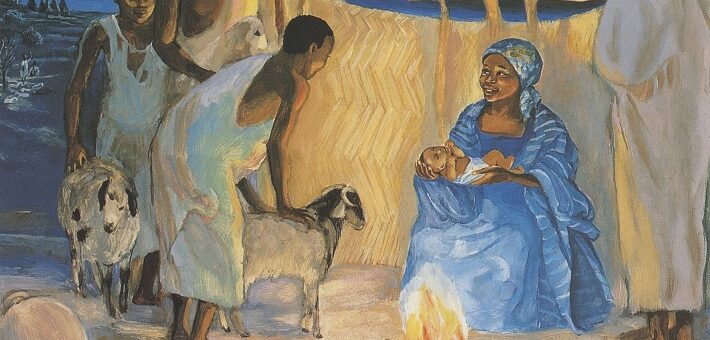Commentary on Luke 2:[1-7] 8-20
For Christmas Day, the lectionary turns to the second half of Luke’s account of the birth of Jesus. This story of shepherds living in the fields and watching over their flock by night hinges on the moment when heaven breaks upon them in full glory, and they become bearers of the wonder, messengers of the holy messengers.
We are so accustomed to the creche that it can be difficult (and enlightening!) to extricate one narrative from another—to observe, for example, that here there is no star but, instead, a sign perfectly suited to shepherds. In light of the prophetic praise of Mary’s Magnificat (1:46–55), these first hearers and bearers of the gospel of the Savior-Messiah-Lord are the lowly already being lifted up and filled with good things. Luke’s Gospel majors in reversals of this kind. Jesus, like his mother, has a particular interest in the poor and oppressed. His mission statement says as much (4:18–19), and the version of the Beatitudes in this Gospel especially emphasizes it (6:20–26).
These shepherds also evoke the shepherd-kings of Israel—the literal shepherd David and the prophetic references to later kings as bad shepherds, and then to God as the good shepherd who will take control and care for the sheep (Ezekiel 34), which then will point to the shepherd-king Jesus. Jesus as the good shepherd appears explicitly in John 10. But Luke’s parables of the God of the lost and found (15:3–32) include the search for the one lost sheep, and shepherds as the audience of angels continues the suggestion of Mary’s Magnificat that this Davidic shepherd-king will not be primarily for the powerful, wealthy, and socially elevated elite.
With the appearance of the angel of the Lord, the light of glory shines around the shepherds, a visual display of the prophecies of Zechariah (1:78–79) and Simeon (2:32). The shepherds are terrified, as Peter, James, and John will be when enveloped in the glory of the transfiguration (9:28–36). Then the angel speaks and great joy breaks through great fear.
Angels (the Greek word angelos means “messenger” but is translated “angel” when the message is from God) feature prominently at the beginnings and ends of the Gospels. In the intertwining birth narratives of Luke, angels ensure and herald the coming of Christ and of John, the messenger (angelos!) to prepare his way. Matthew’s angels appear to Joseph and the magi in dreams of instruction and warning to protect the life of the child born king of the Jews (1:20; 2:12–13).
In Mark, where there is no birth narrative, angels minister to Jesus in the wilderness (1:12). Even in John, where there is neither birth narrative nor wilderness temptation, they feature in the first chapter when Jesus promises Nathanael (1:51) that he will see them ascending and descending upon the Son of Man.
Angels, or mysterious angel-like people, appear in all of the resurrection accounts. In Acts, angels direct (8:26) and encourage (27:23–24) the apostles, free them from prison (5:19; 12:711), and strike down Herod after he murders James and lets the crowds acclaim him as a god (12:23). The work and words of God’s messengers are transparently the work and words of God, so when an angel visits, things change in the lives of the visited for purposes larger than themselves.
The word for “bringing good news,” euangelizomai, which is also translated “preach the gospel,” holds within it the word for “angel/messenger,” with the prefix eu- meaning “good.” (Matthew and Mark more often use another verb for “preach” with the noun for “gospel”: euangelion.) So we might say the angel is gospeling the shepherds or angelizing goodness!
The gospeling angel is joined by a multitude of the heavenly host. Though we imagine them singing, the text does not say that they do, and a host is not a choir. A host is an army. The Lord of hosts of the Hebrew Scriptures is their commander. But this army is an army of praise, joining in the joy of Zechariah, Elizabeth, Mary, Simeon, and Anna, with a message of glory in heaven and peace on Earth.
The verb here for the angels’ “praise” occurs only two other times in Luke. The praise of the crowds at Jesus’ entry to Jerusalem (19:37–38) will echo the words of the angels. And here in 2:20 the praising and glorifying of the angels will be taken up by the shepherds, the first heralds of the birth to the world beyond the pasture.
The phrase “those whom he favors” is the word for “human beings” alongside the word for “good will” or “pleasure.” The verbal form of this occurs in the affirmation of parental pleasure at the baptism (3:22). When directed toward humanity here, this is not a test to be passed so that peace may be given. It is grace—a benediction on all the Earth—but delivered in this moment only to the shepherds. Whether it goes beyond the pasture is left to them.
When God’s messengers appear, the world changes for someone—miracle children are born, prisoners are released, empty tombs are reinterpreted, and here the shepherds are infused with the benediction they have received.
When the shepherds find the child and see the sign of the manger, they themselves become the messenger-angels of gospel. As the peace and joy have been made known to them, they now make it known. Everyone is amazed. Even Mary, the prophetic poet of praise par excellence, who has already been visited by an angel and overshadowed by the power of the Most High (1:35), treasures their words and ponders them in her heart.
Having done the gospeling of angels, the messengers of the messengers return to their flock as a shepherd-host of praise, having witnessed the living, breathing gospel for all people, which is also for them in their particularity—not in some distant past or future time and place but already there where they are. For them are the goodness, the joy, the Savior, and the sign suited specifically for people looking after animals in a field. And they in their particularity have proclaimed it for all people, the Earth, the whole of humanity, whom God is pleased to bless with peace—including us.


December 25, 2024